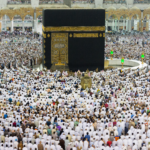The day Hafsah realized something was wrong, she wasn’t in a hospital bed or therapy chair.
She was in her kitchen — standing over a pot of rice — watching it burn.
The smell of smoke snapped her back to reality. She blinked, turned off the gas, and stared blankly at the charred pot. Her heart sank — not because of the rice, but because she couldn’t even cry about it. She was just… numb.
That night, her husband asked gently,
“Are you okay, Hafsah? You’ve been quiet lately.”
She forced a smile.
“I’m just tired,” she whispered.
But even as the words left her lips, she knew they weren’t true.
This wasn’t tiredness.
This was empty.

Hafsah had built a life around doing everything for everyone.
The perfect employee. The dependable friend. The present mother. The always-available daughter.
She could juggle ten things at once — until suddenly, she couldn’t.
She started waking up late for Fajr, missing her morning Qur’an sessions, skipping breakfast, and faking smiles in meetings. Her faith felt distant. Her joy, blurry.
Every night she told herself, “Tomorrow, I’ll do better.”
But tomorrow always came heavy.
One Friday, during a presentation, Hafsah’s vision blurred. Her hands trembled, and her knees felt weak. She excused herself and rushed to the restroom.
Leaning on the sink, she stared at her reflection — the woman who looked back didn’t feel like her anymore.
“Ya Allah,” she whispered, her voice cracking,
“Why do I feel so lost, even when I’m doing everything right?”
For the first time in months, she allowed herself to cry.
And in that moment, something inside her broke — not her strength, but her silence.
That night, Hafsah sat on her prayer mat long after Isha, wrapped in her hijab like a blanket of safety. She didn’t ask for success or promotion this time.
She asked for peace.
“Ya Allah… teach me how to breathe again. Teach me how to find You in the quiet.”

The tears came easily — not from sadness, but from surrender.
And that’s when her healing began.
Hafsah didn’t heal in a day. Healing came slowly — through small acts of mercy to herself.
She began taking early morning walks again — barefoot on the grass, whispering Alhamdulillah with each step. She turned off her phone during meals. She listened to Qur’an instead of podcasts.
She reconnected with her salah, not as a duty, but as a conversation.
She stopped rushing her sujood — she stayed longer, sometimes just whispering,
“Ya Allah, I’m tired, but I’m still here.”
And somehow, that was enough.
One afternoon, her best friend Maryam called.
“You’ve gone quiet on us. Are you okay?”
Hafsah smiled.
“I’m learning how to be okay, slowly.”
“Alhamdulillah,” Maryam replied softly. “Maybe this is Allah’s way of telling you to stop running.”
Hafsah chuckled through her tears.
“You’re right. I’ve been running without refueling.”
Weeks later, Hafsah stood on her balcony, tea in hand, watching the sunrise. For the first time in a long while, her chest felt light.
She realized — her burnout wasn’t a punishment. It was a pause.
A divine invitation to realign her life with barakah instead of busyness.
She whispered, “Ya Allah, thank You for slowing me down before I lost myself completely.”
And from that day, she began living softer.
Working slower.
Loving deeper.
Praying longer.
What Hafsah Learned About Healing From Burnout
- Listen to the whispers before they become cries. Burnout starts quietly.
- Rest is not laziness; it’s remembrance. Even the Prophet ﷺ took time to reflect and withdraw for spiritual renewal.
- Simplify your yeses. Every yes to others should not be a no to your own soul.
- Feed your heart the way you feed your goals. Qur’an, dhikr, and silence are your oxygen.
- Allow yourself to be human. You can’t pour from an empty cup — even angels rest between tasks.
That evening, Hafsah texted Maryam a message that captured her new reality:
“I thought burnout was weakness. But now I see — it was Allah’s way of whispering, Come back to Me.”
And she finally did.


